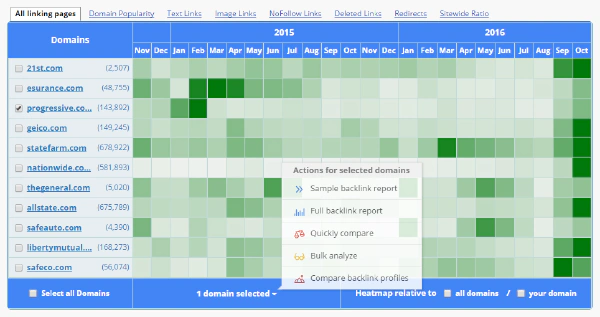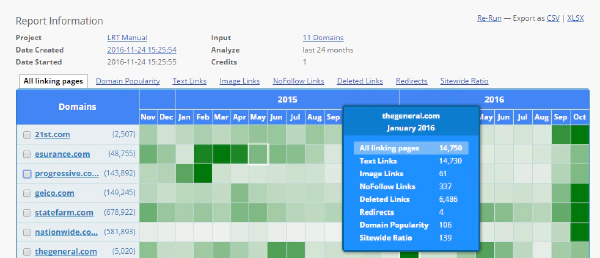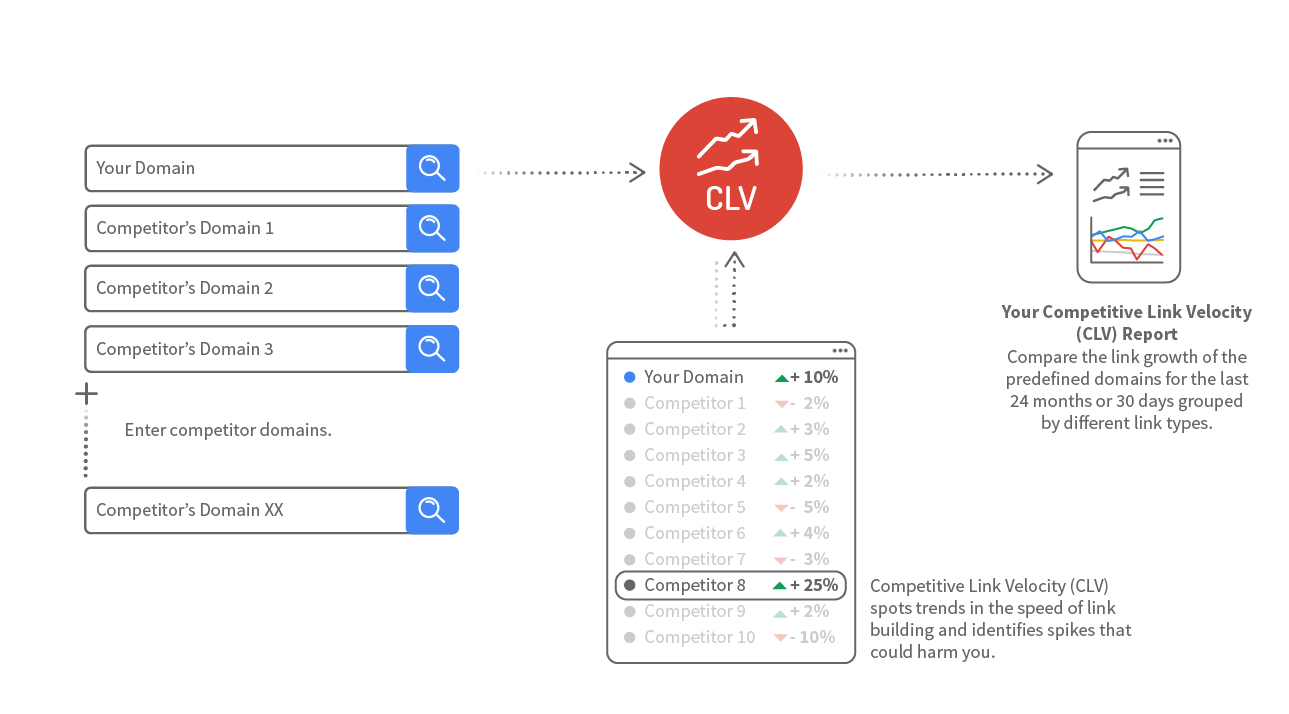Competitive Link Velocity (CLV)
Are you building links too fast or too slow?
Spot trends in the speed of link building and identify spikes that could harm you.
Features
-
Understand the link growth in your niche
-
Learn how to blend in with your competitors
-
Plan link building strategies better
-
Understand your competitive rules
Benefits
-
Analyze the last month or the last two years
-
Spot link trends quick in a heatmap
-
Spot possibly dangerous link spikes
-
Identify and confirm a negative SEO attack
A quick primer on using Competitive Link Velocity
Spot trends in the speed of link building and identify spikes that could harm you.
How You Benefit From the Competitive Link Velocity Tool (CLV)
Competitive Link Velocity (CLV) enables you to view the link growth of your website compared with the link growth of your competitors.
Link velocity is different for every niche, and it is important to understand what is acceptable in the eyes of Google.
CLV allows you to compare your domain with up to 10 competitors. You can use the Find Competing Pages feature or paste the URLs from a list. Then decide if you want to see the link velocity trends over at the last 30 days or the last 24 months.
Competitive Link Velocity Tool (CLV) Features
Easy spotting of spikes and trends in your niche

The factor of link building and link growth speed is simply ignored in many SEO campaigns and link projects, which can lead to nasty surprises. The Competitive Link Velocity Tool (CLV) generates a unique heat map over a period of two years.
You’ll get a new point of view on your link process. The heat map at the Competitive Link Velocity (CLV) tool provides you with changes in Link Popularity, Domain Popularity as well as detailed changes in texts, images, No Follow- and redirect links at a glance.
This heat map allows you a quick comparison of historical changes in link profiles. This means you can evaluate how many links of any kind have been placed or deleted.
Spikes do happen naturally in certain cases, for example when you have special offers, competitions or big events in the media.
Unnatural spikes can be caused by using a poor backlink building service or by negative SEO attacks. As with most tools, this report can be set to re-run automatically either weekly or monthly.
If you are in a niche that has large traffic fluctuations or is very aggressive, CLV is an SEO tool that could save you a lot of grief. Having weekly CLV reports e-mailed to you may be a very good idea.
If you recognize drastic changes in the number of image links, that may point to a successful banner campaign. A sudden boost of No Follow links could point to a lot of interest in forums or blogs, or even a spammy link campaign. Many Redirects could indicate advanced SEO tactics, or again a lot of activity in the social sector through URL shorteners.
Easy retrieval of historical data
If you place your cursor in any part of the heatmap, a popup will give you detailed information about that period, for that domain.

In the example above we can see that in May 2015 iphonefixed.co.uk had a total of 45,414 linked pages. On these pages, 45,408 text links, 20 image links, and 44,534 No Follow links were created. In this month, 6,714 links were deleted, and zero redirects created. The sitewide ratio is the number of backlinks to the domain (BLdom) vs. the number of linking domains.
Features
Unique SEO Technique
This Link Building Method is not available in any other SEO tool.
25+ Link Data Sources
Link Data from 25+ Data Sources combined.
Full and Rich Exports
You get full XLS exports and rich PDF exports, while competitors cripple their data exports at sometimes 10k rows already.
Link Brain
We can assist you with decades of experience in SEO and links. This is not a matter of course with every SEO software provider.
Dynamic Filters
Filter your results by up to 150+ SEO metrics.
No Trash Data
The links that we DO NOT deliver to you matter! We take pride in filtering out as much nonsense data from other sources as possible.
How Competitive Link Velocity works

Learn more about Competitive Link Velocity
The Halifax Bank suffered a similar fate to Hugo Boss when they lost 20% of their search visibility overnight. This case study uses the CLV to show a huge amount of links being acquired in December 2013.
Competitive Domain Analysis allows you to compare your online competitors and reveal your own strengths and weaknesses. In this articlearticle, Tom Black shows how to use five of the LRT tools for SEO competitive analysis, including CLA.
The CLA tool is very useful tool to understand the SEO landscape your are link building in.
Negative SEO is now a real threat. This article gives seven tips to prevent Negative SEO happening to you. The case study includes how to use CLA to detect dangerous link ratios.